Obi Vincent Wants to Make Your Fitness Routine Fun Again
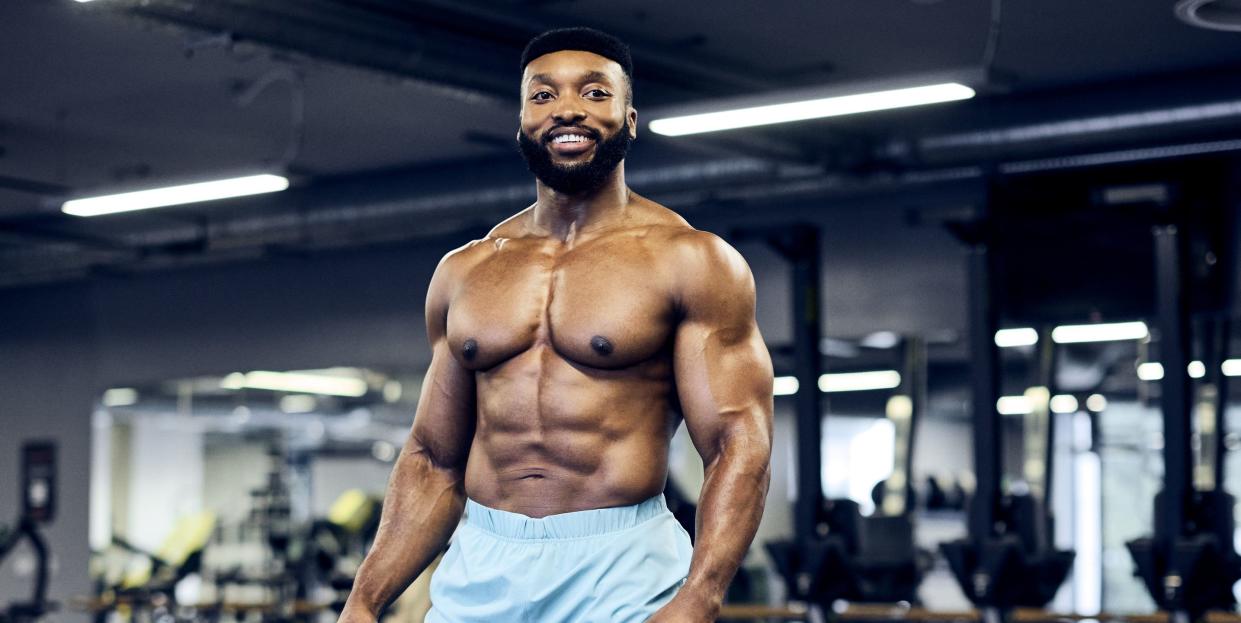
There’s an assumption in the fitness industry that the only way to get results is to take the pursuit very, very seriously. If you’re having fun, you must be doing it wrong, right? This month’s cover star challenges that idea – in a huge way.
Obi Vincent is, in his own words, a former ‘fat kid’ turned bodybuilder, turned genre-defying fitness inspiration to the million social followers he has amassed. His YouTube videos alone have accrued an incredible 73m views. Are they informative? Definitely. Does the fact that Vincent is built like the proverbial brick outhouse help? It can’t hurt. But what really draws people into his gravitational field isn’t so much the content on his social channels, but the content of his character. Relentlessly upbeat and impossibly charismatic, it’s his ever-present smile you notice first.
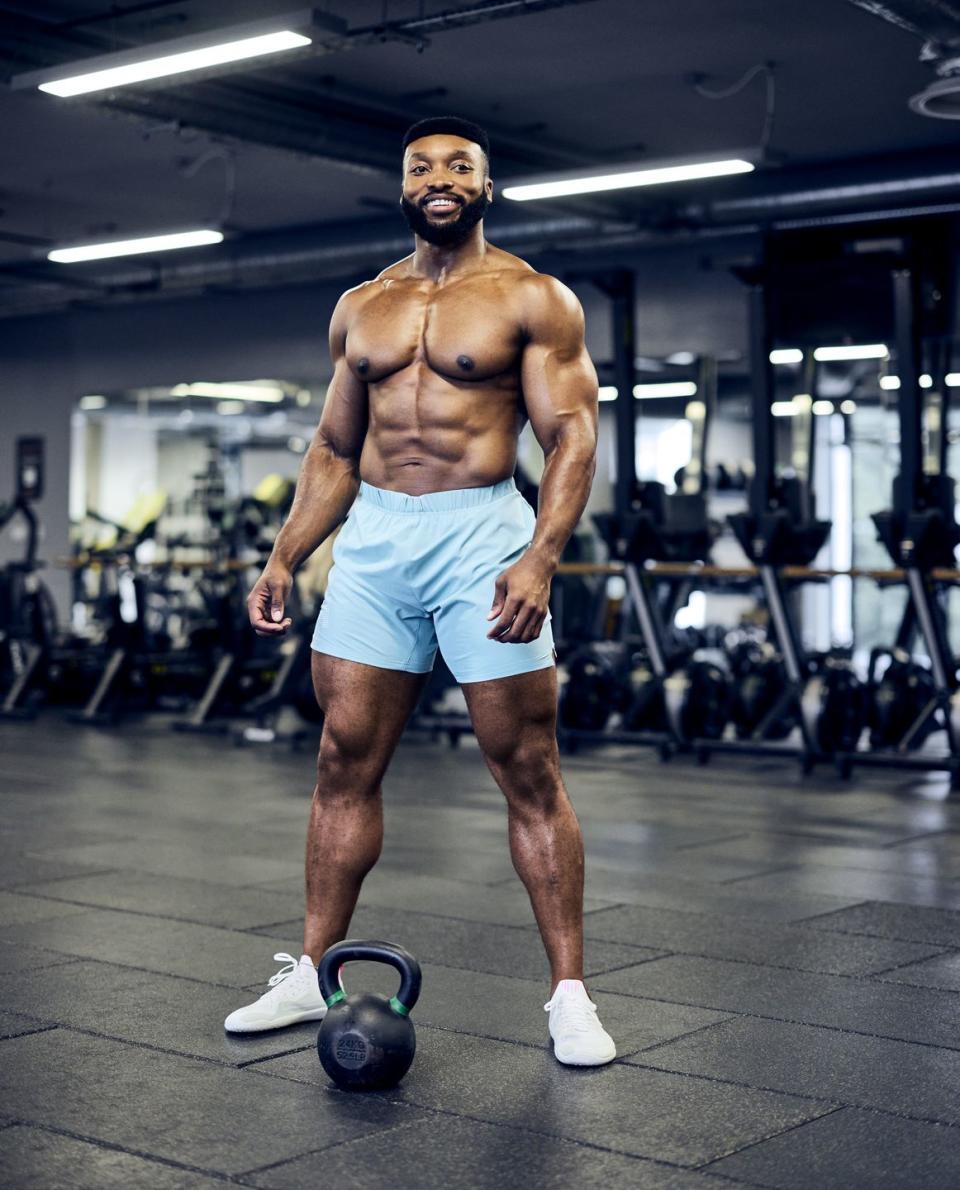
He sat down with MH’s Andrew Tracey to share his belief that while there are a million things you should take seriously, ‘yourself’ isn’t one of them.
Men’s Health: You’ve established yourself as a major player on the fitness scene. How did you build such a strong social following?
Obi Vincent: I started working as a personal trainer in – gosh – maybe 2014? I was working at Selfridges, and someone asked if I had thought about being a PT. At the time, I didn’t really think that was a job. But I went for it. I posted pictures on Instagram when I was prepping for my first bodybuilding show, the Miami Pro.
It was such a long time ago. When you diet down for that sort of thing, you look so shredded. I did a few more shows after that, getting bigger and leaner each time. All of a sudden, people started following me. And that was it – I started growing my presence on social media and in fitness spaces.
MH: How did you get into the gym scene in the first place? Were you always super fit?
OV: I was slightly overweight when I was younger and I decided I wanted to lose it, so I started running. There was a football pitch near where I lived; I used to run there because I was too embarrassed to run on the road. I went on a diet and cut out a lot of things, which, looking back, wasn’t the best [approach].
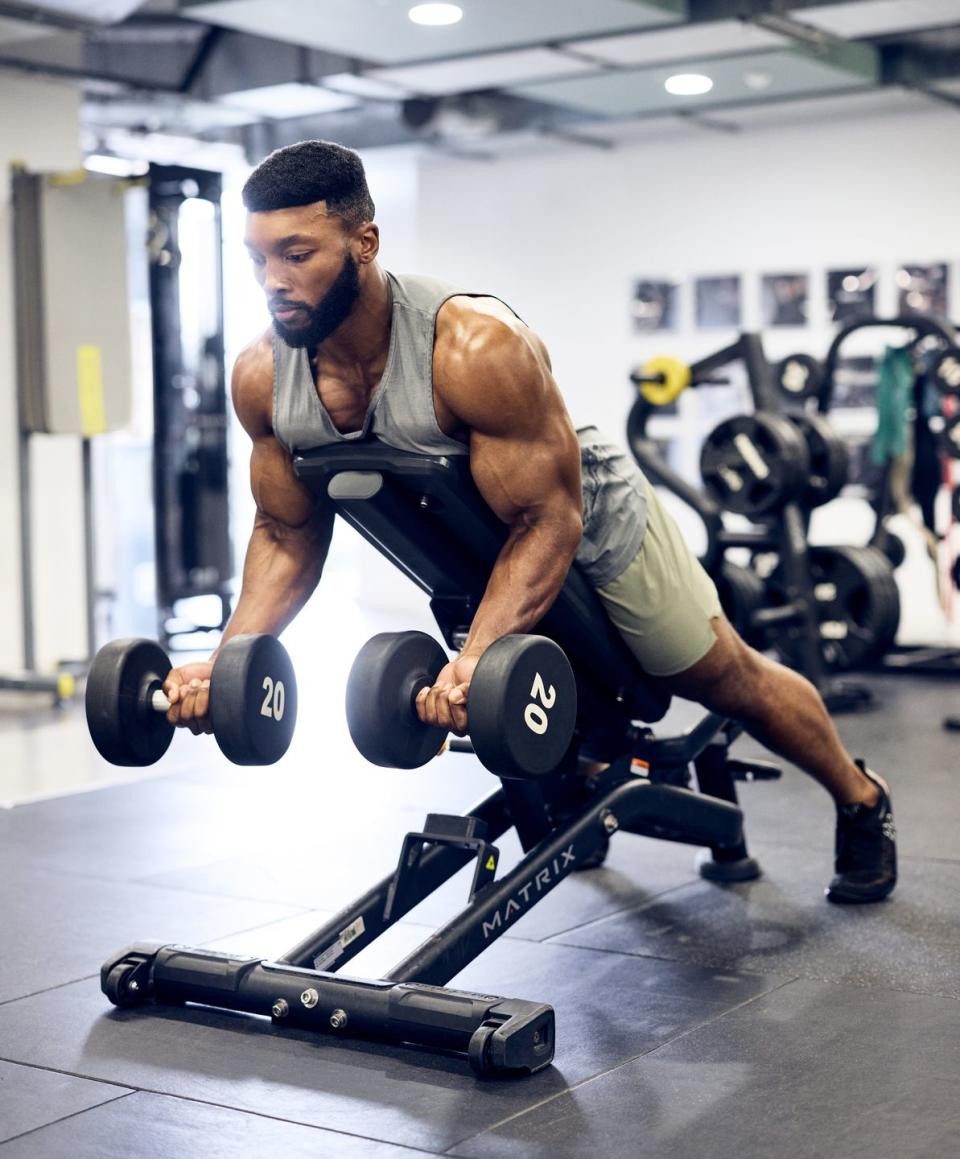
A year or two into it, I had cut a fair bit of weight. I went to this bar after work where I saw this guy who was huge. He had muscles I’d never seen before, apart from when I was watching WWE as a kid. I said, ‘How do you get that big? How is that possible?’ He asked whether I went to the gym and I shook my head. ‘Well, you need to go to the gym!’ he said.
I went to the gym. But I had no idea what I was doing. YouTube was all pranks back when I started going, so I watched and copied [other gym-goers].
MH: Were you into any sports when you were growing up?
OV: I didn’t do sports, man. I was pretty much an introvert and a TV person. I loved TV, I loved movies and I loved food. I’d write sick notes for myself to get out of PE. I was raised by my aunt, and she didn’t know. We had a parents’ evening meeting and the first time she met the PE teacher, they said it was a shame I wasn’t around for the classes. She had no idea. I had to admit that I used to go and play video games. I got in a lot of trouble for that.
Being big when I was younger wasn’t out of the ordinary for a Nigerian. In our culture, if you’re big, if you’re chunky, it’s seen as a good thing. It’s a sign of good health because you’re eating; you’re being fed right. I didn’t realise that being over 15st at the age of 16 wasn’t ideal.
MH: What was the turning point?
OV: It was at my first job. This girl was making funny noises because of my weight. She was joking, and probably had no idea that I was taking it to heart. That was the switch.
I work out now because I want to be healthy and to do this for a long time. The cool thing about training is that even if you’re doing it solely for one set of reasons, you’re always going to have that sweet side effect of the health benefits. People like to talk about bodybuilding not being that good for you; that you need cardio for health. But if you’re training at a good intensity, you’re still getting your heart rate up and all of the benefits.
MH: You refer to yourself a ‘Crossliftr’. Where did that come from, and how did you progress from bodybuilding to CrossFit to this style of training?
OV: It was a coincidence. I lived in Clapham and this guy, Jamie, who does video production, lived nearby. He’d followed my page for a while and he was into CrossFit, so he came up with the idea of a ‘Bodybuilder Vs CrossFit’ video. I used to think CrossFit was a joke, but I was getting bored of just doing bodybuilding, so I said, ‘Let’s do it.’
I did my first ever CrossFit workout with [popular fitness vlogger] Craig Richey. It was eye-opening. I thought CrossFit was just, you know, doing loads of cardio. The conditioning workout was a 21-15-9 [rep scheme] of pull-ups, 100kg deadlifts and calories on the Assault Bike. I’ll never forget the feeling after. Craig finished in six minutes. I was going for almost 10 minutes…
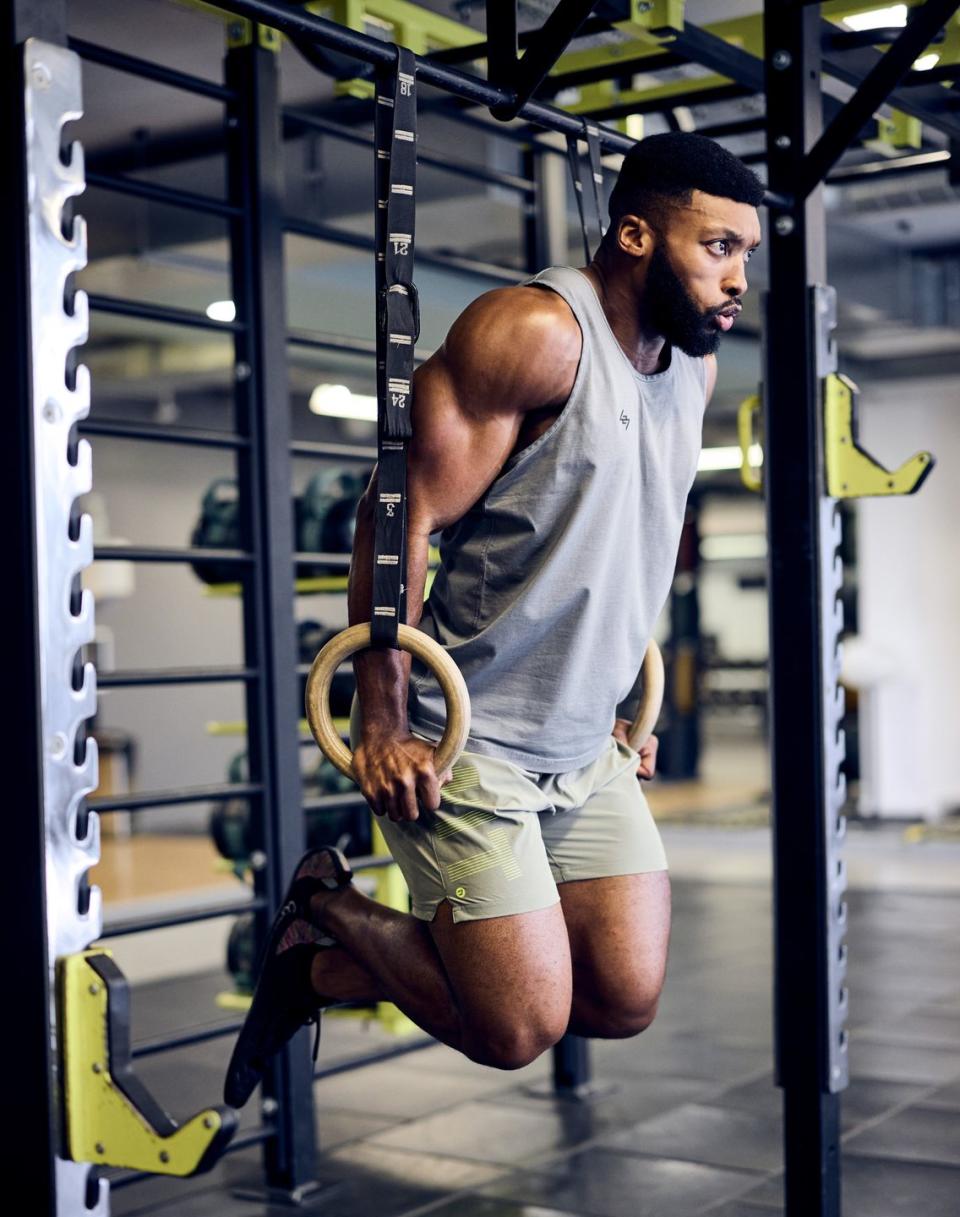
That lit a fire under me. I’m meant to be fit, but I couldn’t keep up. I was dying on the bike. I was like, ‘Right! You need to be more than just an aesthetic. You need to apply yourself and be more well-rounded.’
I fell in love with CrossFit-style workouts, but it’s not the only thing I do. I still lift and train in the way I always have; I blend the two, which is why I call myself a Crossliftr.
Then I saw this kettlebell master on YouTube. He was this Russian guy who just had cargo shorts on and he was teaching all the proper techniques. Kettlebells were often used as doorstops in the gym. No one touched them. But I was fascinated by the way he was moving this 30kg weight. After having my eyes opened with CrossFit, I wanted to be more open to new things like that.
That’s where my slogan ‘Break The Mould’ came in. If you have an opinion about something, you should probably try it first. I used to have a bad habit of criticising things without trying them. So, after functional fitness and kettlebell training, I started to explore mobility, too. I used to think that yoga and Pilates were for women, but now I’ve tried both and seen how hard it is. I practise all the time and encourage other people to give it a go.
MH: What benefits have you seen from blending yoga and flexibility work into your training?
OV: In CrossFit, you have to do overhead squats, pistol squats… I couldn’t do any of it. When it came to Olympic lifting, I had zero mobility. I was so stiff. I went down this rabbit hole researching mobility exercises. Then I found this yoga channel aimed at men. They would tweak the poses a bit to make it more ‘manly’, which is funny to say now. Although I found them hard, I actually enjoyed it.
It started to feed into my movement in the gym. My overhead squats were better, I was getting better at the snatch and clean and jerk. Thrusters and all of the kettlebell work, too. Yoga is tough, man. An hour will have you sweating for sure. But the benefits are clear. Your ankle flexibility, your hips get way less tight and your shoulders. I have great shoulder mobility now because of yoga.
MH: Bodybuilding and CrossFit have traditionally been at odds. Do you feel like you’re in the middle of it?
OV: I encourage both sides to try each other’s style. I say to bodybuilders that there’s no point in being all muscular if you can’t move because your arms are so stiff. Or if you have zero engine in terms of aerobic capacity because you feel like having muscles is enough. And if I’m in a CrossFit box, I always say that some bodybuilding will only help them. Like doing strict pull-ups to help with your kipping pull-ups or more benching if your shoulders are slightly weaker. Or add some shoulder press and more unilateral work rather than always using a barbell.
Another element missing a bit on the CrossFit side is not enough information on nutrition. In bodybuilding, it’s a given that nutrition comes first, then training. Some people never progress, whatever sort of training they are doing, because their diet isn’t on point.
MH: You’ve got 906,000 followers on Instagram alone. How hard do you think about the way you present yourself, or the information you put out?
OV: I didn’t want anyone to just come to my page and it’s just me, posting a selfie, which it was in the past. I want my content to be educational. When I got into kettlebells, I felt responsible. I wanted to make sure that people are taking something away, right? About how you can train and why I like doing certain exercises and why I like doing certain things. What I’ve learned and mistakes I’ve made.

I’ve had so many people come up to me and say that I’ve helped them. Especially during lockdown, when a lot of people started my home workouts. People say they’re inspired by my aesthetics or that my body-weight workouts have helped them get back into fitness. I’ve not said this before, but I’m proud of myself for that. I love seeing comments about how I have helped influence someone, in terms of their training or changing their lifestyle. That it’s not just about the way I look.
Social media can get a bad rap sometimes, and thinking about the number of followers I have is strange for me. I still get impostor syndrome. Someone will say hello to me on the Tube, or walking down the street in a different country and I sometimes can’t believe it.
MH: Say you jump into a lift on the top floor and a person asks you how they can change their life for the better. You’ve got until the ground floor to give them the tools. What do you say?
OV: I’d ask questions. Why do you want to do it? Are you doing this for yourself, or because other people want you to change? It’s an important distinction. Then, do you see yourself continuing to do this long-term? That makes people think – because health and fitness is a long game, right? Think short-term and you set yourself up to fail.
Then I’d say that, from my experience, it helps to be open-minded when it comes to training. Don’t stick with one thing. People get bored, they don’t change what they’re doing and they lose the passion. If you get to a stage where you’re bored with your training, why not try something new? You’ll get bored. We all do. It’s how you react that matters. Be honest with yourself and focus on having fun. A lot of times I fell into the trap of not enjoying it myself. I was just doing it because I was being critical of my physique or was obsessed with being bigger.
Be honest with yourself. Be flexible with how you do it. Be open to trying new things. That way you’re going to have a lot of fun with fitness for the rest of your life.
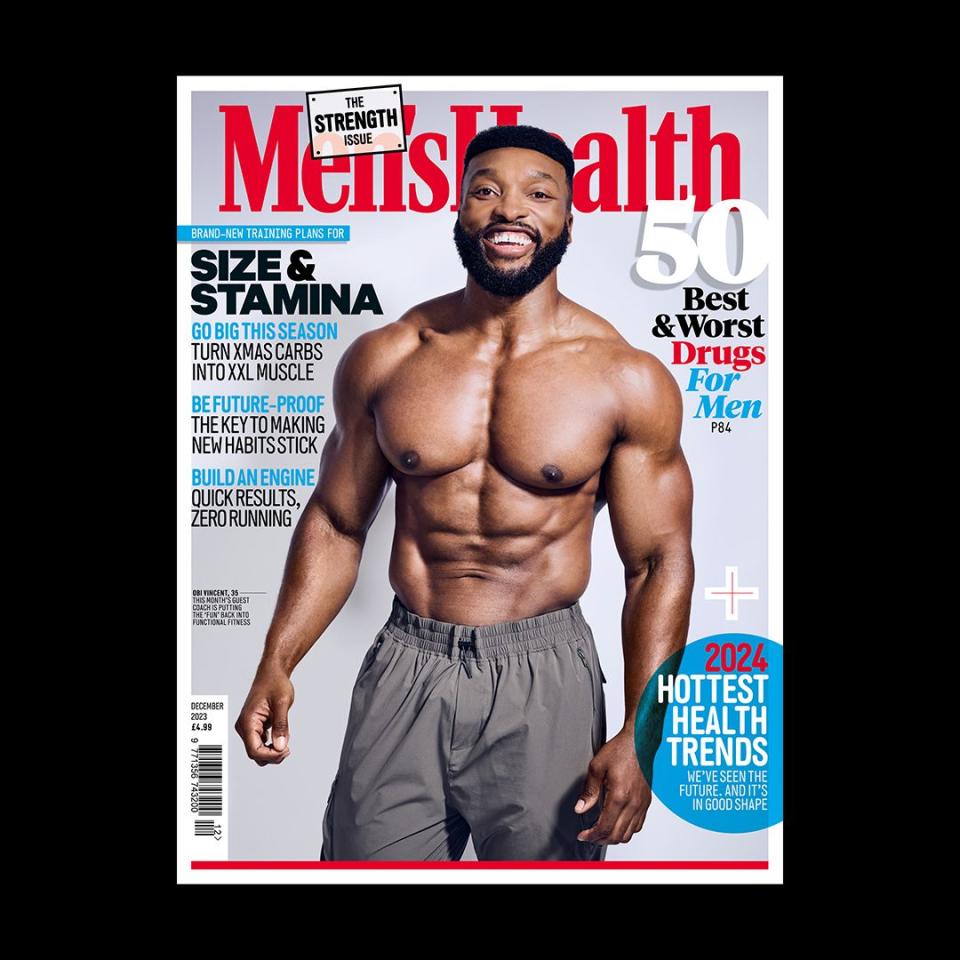
The December 2023 issue of Men’s Health UK is on sale now. Subscribe from just £6 for six months to ensure you never miss an issue.
You Might Also Like


